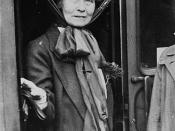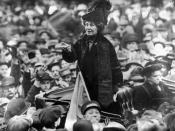Women's Suffrage Movement
Following the turn of the century, the way the way the western world would view the rights
granted to women would change greatly. Two of the main reasons were literary works composed by
John Stuart Mills and Emmeline Pankhurst. Their writings, The Subjection of Women and My Own
Story respectively, left an impact on society that ended up with the ratification of certain standards
bestowed upon women. Both works use similar techniques of persuasion, such as trying to convince
the reader how outrageous the current state is. Pankurst's essay tells of her own unique experience of
people's discrimination against her rights in the free world and the actions that were soon taken to
endorse better treatment of women. According to Pankurst the way that women's activists would
achieve success was by doing, "...something drastic must be done in order to destroy the apathy of the
men..." Somewhat similarly to this stance is that of John Stuart Mills. He claims the injustices to
women were similar to that of slaves (although on a greatly lesser scale) and the new era called for a
change. He states that, "the inequality of rights between men and women has no other source than the
law of the strongest." However the two writers do come from different points of view, mainly due to
the fact of their differing genders. For example, Emmeline Pankhurts talks about her experience as
child when her father remarks, " 'What a pity she wasn't born a lad.' " Naturally Mills cannot tell any
similar tale, but he further proves his case by again referring to the slave argument when he remarks
that, "...we ought to act as if we believed it, and not to ordain that to be born a girl instead of a boy, any...


